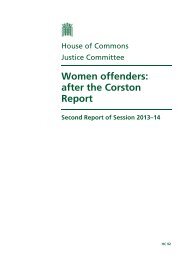Minority voices: Research into the access and acceptability of ... - MMC
Minority voices: Research into the access and acceptability of ... - MMC
Minority voices: Research into the access and acceptability of ... - MMC
- No tags were found...
Create successful ePaper yourself
Turn your PDF publications into a flip-book with our unique Google optimized e-Paper software.
As noted at <strong>the</strong> start <strong>of</strong> this report one <strong>of</strong> <strong>the</strong> central objectives <strong>of</strong> <strong>the</strong> <strong>Minority</strong> Voices studywas to explore <strong>the</strong> barriers to effective <strong>access</strong> to appropriate mental health provision <strong>and</strong>, <strong>the</strong>’flip-side’ <strong>of</strong> this, what facilitates <strong>access</strong> <strong>and</strong> engagement with services. The aim <strong>of</strong> <strong>the</strong>following discussion <strong>the</strong>refore, drawing upon young people’s perceptions <strong>and</strong> experiences, is tohighlight <strong>the</strong> issues, concerns <strong>and</strong> current gaps in provision that providers <strong>of</strong> mental healthservices need to consider which, if unaddressed, may constitute a barrier.Young people’s views on what sort <strong>of</strong> support has worked well <strong>and</strong> <strong>the</strong>ir suggestions forimproving mental health services, including specialist CAMHS, underpin <strong>the</strong> analysis <strong>of</strong> whatmay improve <strong>access</strong> to <strong>and</strong> engagement with services - an important dimension <strong>of</strong> ‘goodpractice’ in considering service development in this field. On this point it was positive to findthat some young people had found <strong>the</strong>mselves in specialist services that had ‘finallyunderstood’ <strong>the</strong>m <strong>and</strong> felt that <strong>the</strong>y had been helped through <strong>the</strong> interventions <strong>and</strong> support<strong>of</strong>fered.Table 1: Ethnic background <strong>of</strong> study participantsEthnic CategoryNumbers <strong>of</strong> young peopleWhite - British 1White - Irish 1White - O<strong>the</strong>r 1Mixed - White & Black Caribbean 12Mixed - White & Asian 4Mixed - O<strong>the</strong>r 1Asian/Asian British - Indian 1Asian/Asian British - Pakistani 6Asian/Asian British - Bangladeshi 4O<strong>the</strong>r Asian/Asian British 4Black/Black British - BlackCaribbeanBlack/Black British - Black African 25Black/Black British - O<strong>the</strong>r 2Not given 8! A wide range <strong>of</strong> worries <strong>and</strong> concernsAt <strong>the</strong> most general level <strong>the</strong> information ga<strong>the</strong>red through <strong>the</strong> study highlighted <strong>the</strong> diversity<strong>of</strong> needs presented by many young people <strong>and</strong> thus <strong>the</strong> challenge facing many services inaddressing <strong>the</strong>se - or being able to ‘signpost’ young people to appropriate sources <strong>of</strong> help. Itappears that many young people may initially approach services seeking help with practicalproblems such as housing <strong>and</strong>, having established a relationship with staff, may <strong>the</strong>n begin totalk about issues connected to <strong>the</strong>ir mental well-being. At this point staff underst<strong>and</strong>ing <strong>of</strong>mental health <strong>and</strong> <strong>the</strong>ir knowledge <strong>of</strong> local provision becomes critical since <strong>the</strong>y can play a keyrole in facilitating <strong>access</strong> to specialist provision. A lack <strong>of</strong> knowledge at this ‘frontline’ levelclearly constitutes a potential barrier to young people <strong>access</strong>ing appropriate help.The interviews <strong>and</strong> focus groups touched on <strong>the</strong> following: education <strong>and</strong> employment;physical health; discrimination <strong>and</strong> racism; family relationships; inclusion in local community;money <strong>and</strong> finances. For young refugees <strong>and</strong> those seeking asylum, past traumaticexperiences, worries about <strong>the</strong>ir legal status <strong>and</strong> how long <strong>the</strong>y might stay in <strong>the</strong> UK wereprominent. These young people also talked <strong>of</strong> difficulties <strong>access</strong>ing help <strong>and</strong> support fromservices to deal with <strong>the</strong> past traumatic experiences, losses <strong>and</strong> grief many had experienced -a finding which echoes <strong>the</strong> concern noted by a number <strong>of</strong> <strong>the</strong> pr<strong>of</strong>essionals who returnedmapping questionnaires.6<strong>Minority</strong> Voices <strong>Research</strong> Report25
















